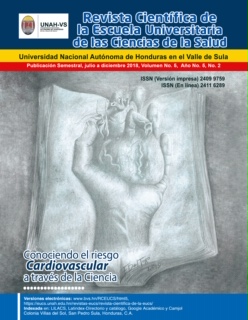KNOWLEDGE, CONDITIONING FACTORS AND CHARACTERISTICS OF SELF-MEDICATION IN NURSING AND MEDICINE STUDENTS
DOI:
https://doi.org/10.5377/rceucs.v5i2.7631Keywords:
Self-medication, Students, IncidenceAbstract
Self-medication is a practice of subjective moral denomination very common in outpatients, who opt to purchase medicines without medical prescription for the relief of ailments, often considered low severity. Objective: To determine the knowledge, conditioning factors and characteristics of self-medication in the Nursing and Medicine Careers of the Escuela Universitaria de Ciencias de la Salud de la Universidad Nacional Autónoma de Honduras en el Valle de Sula (EUCS/UNAH-VS) in the first semester of 2017. Patients and Research Methodology: A quantitative, descriptive, cross-sectional and prospective study, carried out in students of the nursing and medicine career of the EUCS/ UNAH-VS who were in their 2nd and 3rd year of school during the first semester of 2017. The sample was non-probabilistic for the
convenience of 55 students belonging to each career; in total 110. Results: It was found that 50 (90.9%) nursing students and 49 (89.09%) of medicine admitted to self-medication. Most do not know the indications and/ or adverse effects of the drugs used to self-medicate. 45.45% (25) of nursing and 63.63% (35) ignore the dosage. 67.27% (37) of nursing and 61.8% (34) of medicine are unaware of the adverse effects of excessive dosages. The main cause of self-medication was the consideration of the discomforts as not serious, being handled at home. Conclusion: The majority of students in both careers are unaware of indications, adverse effects and dosing of medications and take them considering the non-serious discom- forts and not the effects that the medication may cause. The main the symptom they presented was headache and the medicine they consomed was acetaminophen.
Downloads
6176




